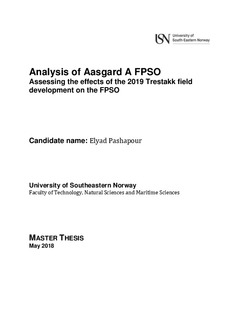| dc.description.abstract | With developing oil fields in deep seas, crude oil transferring and storage become the main challenges for companies. They need to determine a reliable float storage unit capacity as well as a suitable and economical shuttle/oil tanker carrying the capacity. Scheduling each offloading plan is not accurate because it is likely to be affected by environmental conditions and unstably of production rate due to equipment failure. The main impacts of deviation from scheduled plan is on field crude oil production amount and undesired increase on unit downtime, which directly decreases company’s income. A solution to cope with environmental conditions is using floating units. One of the common type among float units, called Floating, Production, Storage, Offloading unit that known FPSO. FPSO is a ship shaped float unit that possible to convert from oil tankers in a short time.
The aim of this thesis is to investigate and evaluate the future and current situation of a floating unit in an offshore field relating to production, storage and offloading operations. It also looks for future situation change and field development that might lead to re-planning in the Norwegian Sea area as a case. The Norwegian Sea is famous with rough environment large waves and sudden high-speed winds, which poses significant risk on offloading operation. Therefore, offloading operations require an accurate predict of wave data and understanding sea dynamics. The Aasgard group oil and gas fields are currently producing oil and gas, diverting crude oil on board a FPSO and storing and exporting form there. The Trestakk project is an example on such development that will join to Aasgard group in 2019. This new field has challenges related to extra crude oil rate to “Aasgard A” FPSO. Already stored oil is exported to market via shuttle tanker directly from the field to the oil terminal at Antwerp port, Belgium. Challenges begin when on one hand extra oil flows to certain storage capacity, and on the other hand, weather restriction extremely affects offloading operation. Reason for work as case study was gathering accurate environmental and operational data of field and exported destination place.
The main research questions were:
1. How increasing crude oil rate can change the offloading schedules?
2. How much shuttle/oil tanker should has the capacity to ensure sufficient crude oil transferring from field to prevent production downtimes?
3. What is the economical scheduling and plan for the field?
The research questions were answered by investigating the Aasgard A data, local met-ocean history and interview by marine sector professionals | nb_NO |
